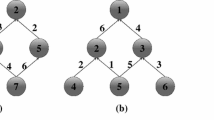Abstract
The determination of the assembly sequence is an important decision in assembly planning. Optimum sequence selection is challenging because of several reasons such as optimization criteria and precedence constraints. Furthermore, a product can be assembled in many different alternatives in accordance with different sequences, thereby making the optimization of assembly sequences a multi-modal solution optimization problem. To allow the process planner to decide, unique optimum solutions are required to be develop as much as possible. In this study, the assembly sequence of a product was optimized by applying an algorithm known as the Bees Algorithm. To assess the performance of this Algorithm, the results are compared with results found by other algorithms. It is shown that, the Bees Algorithm obtained similar optimum fitness value with other algorithms but with the greatest number of optimal assembly sequences. As a result, the Bees Algorithm outperforms other algorithms in dealing with the multi-modal optimization problem of assembly sequence optimization.
Access this chapter
Tax calculation will be finalised at checkout
Purchases are for personal use only
Similar content being viewed by others
References
De Fazio TL, Whitney DE (1987) Simplified generation of all mechanical assembly sequences. IEEE J Robot Autom 3(6):640–658
Dong T, Tong R, Zhang L, Dong J (2007) A knowledge-based approach to assembly sequence planning. Int J Adv Manuf Technol 32(11–12):1232–1244
Pham DT, Ghanbarzadeh A, Koç E, et al (2006) The Bees Algorithm – a novel tool for complex optimisation problems. In: Intelligent production machines and systems - 2nd I*PROMS virtual international conference 2006, pp 454–459
Mishra A, Deb S (2019) Assembly sequence optimization using a flower pollination algorithm-based approach. J Intell Manuf 30(2):461–482
Özmen Ö, Batbat T, Özen T, Sinanoğlu C, Güven A (2018) Optimum assembly sequence planning system using discrete artificial bee colony algorithm. Math Probl Eng 2018. Article ID 3407646, 14 pages
Yuan W, Chang L, Zhu M, Gu T (2016) Assembly sequence planning based on hybrid artificial bee colony algorithm. In: Shi Z, Vadera S, Li G (eds) Intelligent information processing VIII, IIP 2016. IFIP advances in information and communication technology, vol 486. Springer, Cham
Seeley TD (1995) The wisdom of the hive: the social physiology of the honey bee colonies. Harvard University Press, Cambridge
Pham DT, Castellani M (2009) The bees algorithm: modelling foraging behaviour to solve continuous optimization problems. Proc Inst Mech Eng Part C J Mech Eng Sci 223(12):2919–2938
Yusof NJ, Kamaruddin S (2021) Optimal design of step – cone pulley problem using the bees algorithm. In: Bahari MS, Harun A, Zainal Abidin Z, Hamidon R, Zakaria S (eds) Intelligent manufacturing and mechatronics. Lecture notes in mechanical engineering. Springer, Singapore
Zhou Z, Xie Y, Pham D, Kamsani S, Castellani M (2016) Bees Algorithm for multimodal function optimisation. Proc Inst Mech Eng C J Mech Eng Sci 230(5):867–884
Bala Murali G et al (2018) Modified BAT algorithm for optimum assembly sequence planning. IOP Conf Ser Mater Sci Eng 377:012091
Gao L, Qian WR, Li XY, Wang JF (2010) Application of memetic algorithm in assembly sequence planning. Int J Adv Manuf Technol 49:1175–1184
Zhou W, Zheng JR, Yan JJ, Wang JF (2011) A novel hybrid algorithm for assembly sequence planning combining bacterial chemotaxis with genetic algorithm. Int J Adv Manuf Technol 52:715–724
De Fazio T, Whitney D (1987) Simplified generation of all mechanical assembly sequences. IEEE J Robot Autom 3(6):640–658
Acknowledgements
This study was supported by FRGS grant No. FRGS/1/2019/TK03/UIAM/02/3 from Ministry of Higher Education Malaysia (MOHE). Authors also grateful to the International Islamic University of Malaysia (IIUM) which made this study possible.
Author information
Authors and Affiliations
Corresponding author
Editor information
Editors and Affiliations
Rights and permissions
Copyright information
© 2022 The Author(s), under exclusive license to Springer Nature Singapore Pte Ltd.
About this paper
Cite this paper
Kamaruddin, S., Azmi, N., Sukindar, N.A. (2022). Assembly Sequence Optimization Using the Bees Algorithm. In: Khairuddin, I.M., et al. Enabling Industry 4.0 through Advances in Mechatronics. Lecture Notes in Electrical Engineering, vol 900. Springer, Singapore. https://doi.org/10.1007/978-981-19-2095-0_36
Download citation
DOI: https://doi.org/10.1007/978-981-19-2095-0_36
Published:
Publisher Name: Springer, Singapore
Print ISBN: 978-981-19-2094-3
Online ISBN: 978-981-19-2095-0
eBook Packages: Intelligent Technologies and RoboticsIntelligent Technologies and Robotics (R0)




